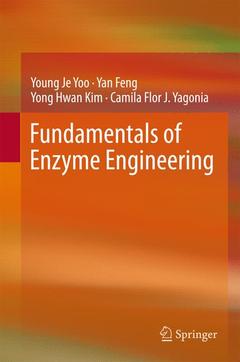Description
Fundamentals of Enzyme Engineering, Softcover reprint of the original 1st ed. 2017
Authors: Yoo Young Je, Feng Yan, Kim Yong-Hwan, Yagonia Camila Flor J.
Language: English
Subjects for Fundamentals of Enzyme Engineering:
Approximative price 137.14 €
In Print (Delivery period: 15 days).
Add to cartPublication date: 01-2017
Support: Print on demand
Approximative price 94.94 €
In Print (Delivery period: 15 days).
Add to cartPublication date: 07-2018
Support: Print on demand
Description
/li>Contents
/li>Biography
/li>Comment
/li>
This book provides a comprehensive introduction to all aspects of enzyme engineering, from fundamental principles through to the state-of-the-art in research and industrial applications.
It begins with a brief history, describing the milestones of advancement in enzyme science and technology, before going on to cover the fundamentals of enzyme chemistry, the biosynthesis of enzymes and their production. Enzyme stability and the reaction kinetics during enzymatic reactions are presented to show how enzymes function during catalysis and the factors that affect their activity. Methods to improve enzyme performance are also presented, such as cofactor regeneration and enzyme immobilization. The book emphasizes and elaborates on the performance and characteristics of enzymes at the molecular level. Finally, the book presents recent advances in enzyme engineering and some key industrial application of enzymes addressing the present needs of society.
This book presents essential information not only for undergraduate and graduate students, but also for researchers in academia and industry, providing a valuable reference for the development of commercial applications of enzyme technology.
I. Introduction to Enzyme Engineering.
1. Introduction. 1.1 Brief History of Enzyme Engineering. 1.2 Industrial Application of Enzymes.
2. Biosynthesis of Enzymes. 2.1 Basic Enzyme Chemistry. 2.2 Biosynthesis of Enzymes.
3. Production of Enzymes. 3.1 Sources and Screening of Enzymes. 3.2 Production of Enzymes.
II. Enzyme Reaction Engineering.
4. Enzyme Reaction Kinetics. 4.1 Michaelis-Menten Kinetics. 4.2 Other Enzyme Kinetics.
5. Regeneration of Cofactors. 5.1 Regeneration of Reduced Nicotinamide Cofactors. 5.2 Regeneration of Oxidized Nicotinamide Cofactors.6. Immobilized Enzymes. 6.1 Methods of Enzyme Immobilization. 6.2 Reactor System and Engineering Considerations.
7. Enzymes in Non-conventional Media. 7.1 Enzymes in Non-conventional Media. 7.2 Stability in Organic Solvent.
III. Molecular Understanding of Enzymes.
8. Engineering Tools for Enzymes. 8.1 Random Mutagenesis. 8.2 Rational and Computational Design.
9. Enzyme Catalysis. 9.1 Mechanism of Enzyme Activity. 9.2 Enzyme Dynamics and Flexibility.
10. Specificity of Enzymes. 10.1 Substrate Specificity. 10.2 Enantioselectivity of Enzymes.
11. Thermodynamics and Stability. 11.1 Enzyme Stability. 11.2 Stabilization of Enzymes.
IV. Application of Enzymes.
12. Enzymes for Chemicals and Polymers. 12.1 Enzymes for Chemicals. 12.2 Enzymes for Polymers.13. Enzymes for Food and Energy. 13.1 Enzymes for Food Industry. 13.2 Enzymes for Bioenergy.
14. Enzymes for Biosensors. 14.1 Enzymatic Measurement. 14.2 Applications of Enzyme Biosensors.
15. Enzymes for Environment. 15.1 Enzymatic Removal of Pollutants. 15.2 Carbon Dioxide Conversion.
Prof. Yoo, Young Je is currently a Professor at the School of Chemical Engineering, Seoul National University and holds a B.S. from Department of Chemical Engineering, Seoul National University and a Ph.D. at the Department of Chemical Engineering, University of Maryland. His research interests are understanding of enzyme’s function at the molecular level and engineering and design of enzyme activity, stability and specificity, and enzymatic reactions for useful chemicals production and environmental applications.
Prof. Feng,Yan is currently a Professor at the School of Life Sciences and Biotechnology, Shanghai Jiao Tong University, China and holds B.S. from Department of Molecular Biology, Jilin University, M.S.from State Key Laboratory of Enzyme Engineering,and M.D. from Basic Medical Sciences School, Bethune Medical University. Her research interests focus on investigating the enzyme structure-function relationship, as well as employing rational design and direct evolution to engineer useful biocatalysts.
Prof. Kim, Yong Hwan is currently a Professor at the School of Energy and Chemical Engineering, Ulsan National Institute of Science and Technology and holds a B.S., M.S., and Ph.D. from Department of Chemical Engineering, Seoul National University. He is actively developing new biocatalysts for the conversion of C1 gas compounds to value-added chemicals based on the profound experience in industry and national research institutes. He has been involved in the commercialisation of enzyme-catalyzed polymerization of phenolics for special coating materials and enzyme-catalyzed production of linin based material for automotive industry.
Prof. Yagonia, Camila Flor J. is currently a professor at the Department of Chemical Engineering, San Carlos University, Philippines. She got BS and Ms degrees from San Carlos University and PhD from Seoul National University. Her research interests include bioenergy pro
Focuses on the biosynthesis of enzymes such as the mutagenesis and expression of protein in a microorganism
Provides useful insights on aspects of enzyme biosynthesis and production as well as their direct industrial application
Describes methods to enhance enzyme stability and catalytic power, enzymes used in non-conventional media and their applications
Includes supplementary material: sn.pub/extras




